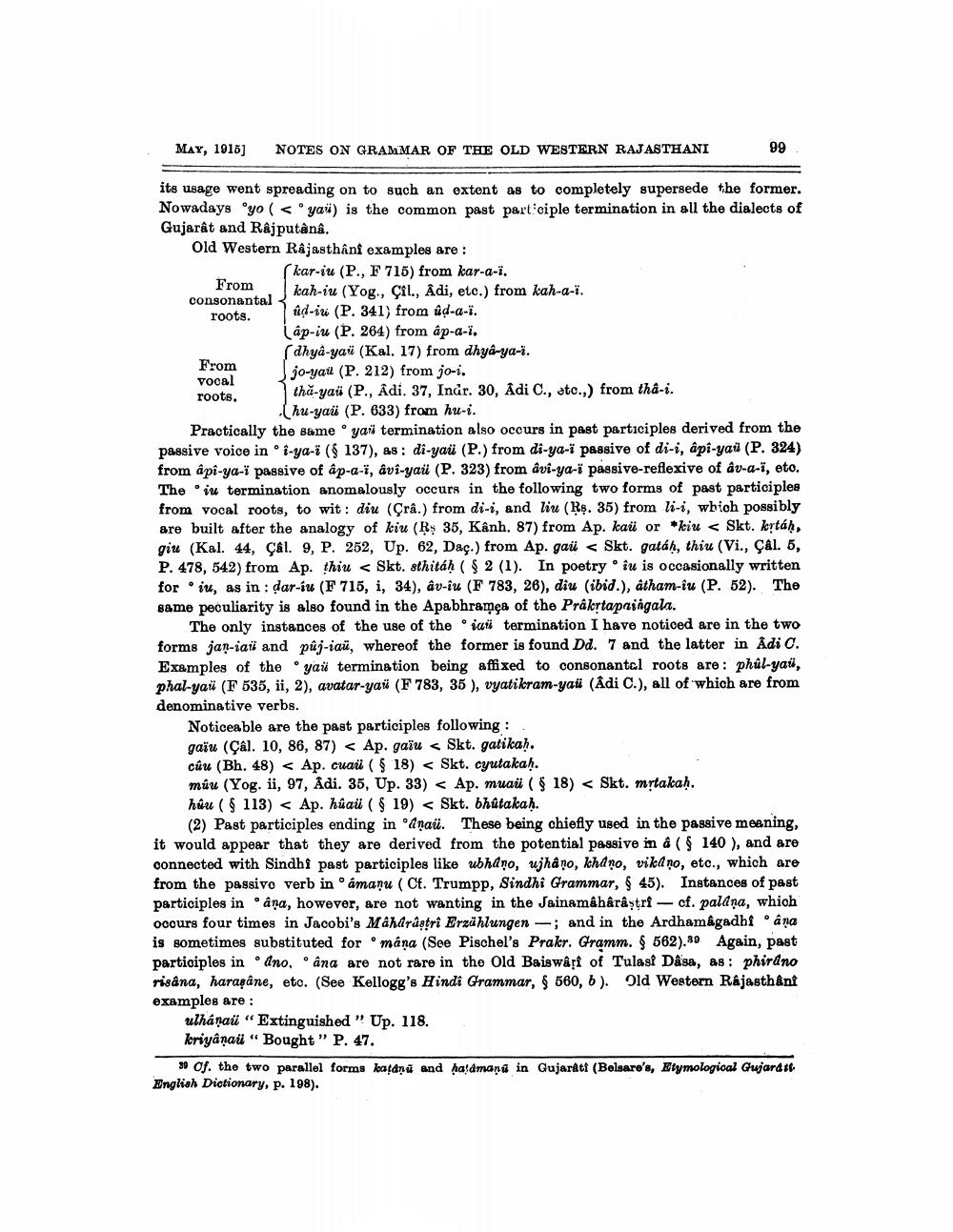________________
MAY, 1916)
NOTES ON GRAMMAR OF THE OLD WESTERN RAJASTHANI
99
its usage went spreading on to such an extent as to completely supersede the former. Nowadays "yo syavi) is the common past participle termination in all the dialects of Gujarât and Rajputânâ. Old Western Rajasthani examples are :
kar-ju (P., F 715) from kar-a-i. From
kah-iu (Yog., Çil., Adi, etc.) from kah-a-i.
wahrig von consonantal roots.
ad-iu (P. 341) from úd-a-i. Lap-iu (P. 264) from ap-a-ï.
sdhya-yaü (Kal. 17) from dhya-ya-i. From
Jjo-yau (P. 212) from jo-i. vocal roots.
tha-yai (P., Adi. 37, Indr. 30, Adi C., etc.,) from tha-i.
Chu-yaü (P. 633) from hu-i. Practically the same yail termination also occurs in past participles derived from the passive voice in 2-ya-i ( 137), as : di-yau (P.) from di-ya-i passive of di-i, api-yai (P. 324) from api-ya-i passive of âp-a-ï, avi-yai (P. 323) from avi-ya-i passive-reflexive of av-a-i, eto. The iu termination anomalously occurs in the following two forms of past participles from vocal roots, to wit: diu (Fra.) from di-i, and liu (Rs. 35) from li-i, which possibly are built after the analogy of kiu (R$ 35, Kênh, 87) from Ap. kai or *kiu < Skt. krtáh, giu (Kal. 44, Çal. 9, P. 252, Up. 62, Dac.) from Ap. gails Skt. gatáh, thiu (Vi., Çal. 5, P. 478, 542) from Ap. thiu < Skt. sthitáh( $ 2 (1). In poetry ° iu is occasionally written for it, as in: dar-íu (F 715, i, 34), av-iu (F 783, 26), diu (ibid.), atham-iu (P. 52). The same peculiarity is also found in the Apabhramea of the Prâlertapaingala.
The only instances of the use of the jai termination I have noticed are in the two forms jan-iaii and půj-iai, whereof the former is found Dd. 7 and the latter in Adi C. Examples of the yait termination being affixed to consonantel roots are: phúl-yaü, phal-yaü (F 535, ii, 2), avatar-yau (F 783, 35 ), vyatikram-yati (Adi C.), all of which are from denominative verbs.
Noticeable are the past participles following: gažu (Çal. 10, 86, 87) s Ap. gažu < Skt. gatikah. câu (Bh. 48) < Ap. cuai ( $ 18) < Skt. cuutakah. muu (Yog. ii, 97, Adi. 35, Up. 33) < Ap. muaü (818) < Skt. mrtakaḥ, huu (§ 113) < Ap. huai ( 19) < Skt. bhatakah.
(2) Past participles ending in Anaü. These being chiefly used in the passive meaning, it would appear that they are derived from the potential passive in a ( 140 ), and are connected with Sindhi past participles like ubhano, ujhâno, khano, vikano, etc., which are from the passivo verb in amanu (Cf. Trumpp, Sindhi Grammar, 45). Instances of past participles in ana, however, are not wanting in the Jainamahârâştri — cf. paldna, which occurs four times in Jacobi's Maharastri Erzählungen -; and in the Ardhamagadhi a na is sometimes substituted for mana (See Pischel's Prakr. Gramm. S 562).30 Again, past participles in dno, ana are not rare in the Old Baiswart of Tulasi Dasa, as : phirdno risana, haragane, eto. (See Kellogg's Hindi Grammar, 560, b). Old Western Rajasthant examples are :
ulhaņai "Extinguished " Up. 118. kriyânaü " Bought " P. 47.
59 Of. the two parallel forms katanu and haldmaņu in Gujarati (Bolsare's, Etymological Gujarat English Dictionary, p. 198).




